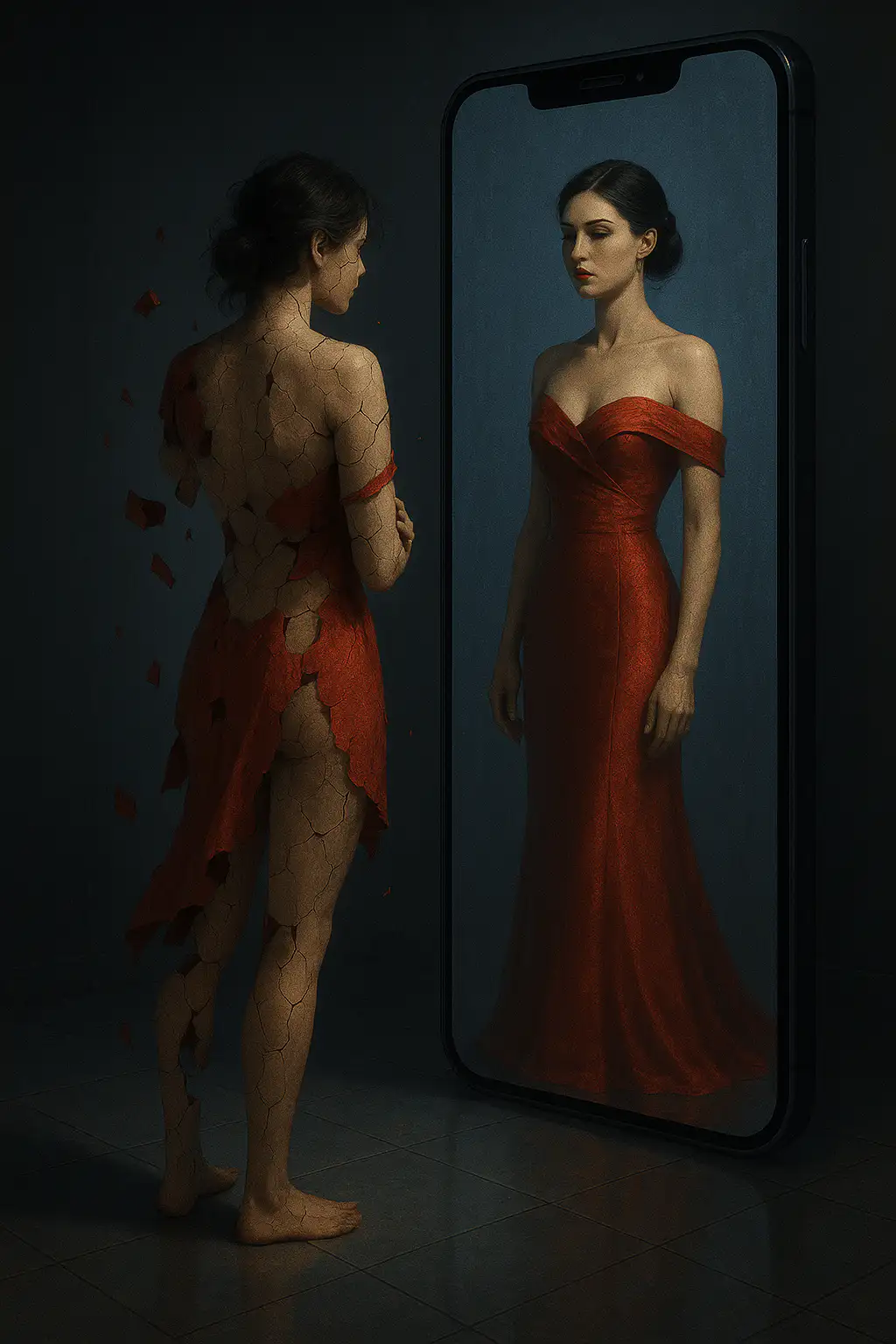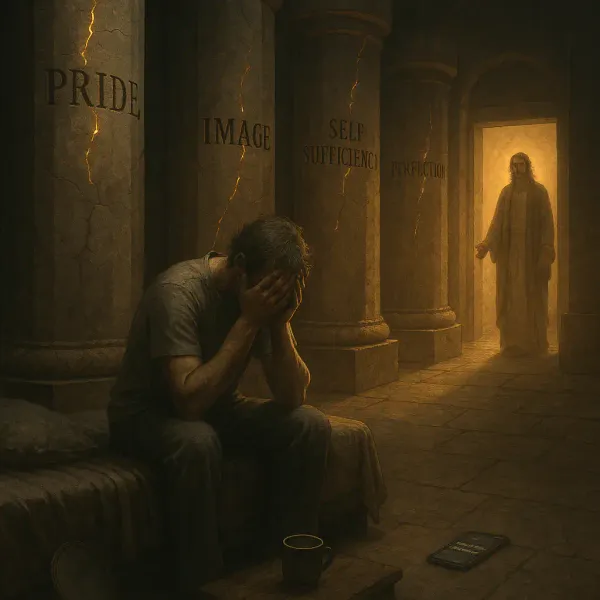The Mirror That Knows Too Much
You thought the algorithm was shaping you. But what if it’s simply reflecting what’s already fractured? This is a story of ambition, collapse, and the mercy of a mirror that doesn’t flatter—only reveals. If you’ve felt that ache, you’re not alone.

You consider yourself open-minded. A reasonable person. A Christ-follower who listens before judging. But the feed tells a different story.
YouTube, once a broad buffet, has become a tunnel. Instagram offers only voices that echo your own. Your podcast queue feels more like an echo chamber than a table of diverse wisdom. Your Spotify suggestions …
The algorithm doesn’t lie. But it doesn’t tell the truth either. It reflects.
“The heart is more deceitful than all else and is desperately sick; who can understand it?” —Jeremiah 17:9 (NASB95)
My heart. Not just sinful. Deceitful. The kind of brokenness that fools even the one bearing it.
What if the algorithm is only a magnifying glass? Not the creator of deception—but its revealer? Not the shaper of desire—but its diagnostician?
We rail against digital systems for what they show us. But perhaps their most disturbing feature is that they show us— the parts of ourselves we’ve been unwilling to confront.
The feed becomes a mirror.
And the mirror, like the Word, cuts deep. (Hebrews 4:12).
Not because it has power, but because we gave it consent.
Consent through clicks, lingering pauses, likes. Through what we stopped for, watched and read. What we couldn’t look away from. What we thought no one else could see.
The algorithm didn’t push you into a political corner. It followed you there.
The illusion is that you are being fed content.
The reality is that you are being reflected— again and again, until the distortion feels like truth.
So before we blame the mirror, we must ask:
What part of me welcomed the reflection?
When Invisibility Becomes a Mirror
For years, I felt unseen. Unappreciated. I watched others take credit for work I'd done, while I served faithfully in the background. I told myself this was my cross to bear—that humble service was just harder to recognise.
But when the same pattern repeated across different communities, different contexts, different relationships, I had to ask: What if I'm the common denominator?
The mirror was reflecting something I couldn't see: my desperate need to be needed. My people-pleasing radiated out of me like a signal, attracting some who would use it and confusing others who didn't know how to respond to someone who wouldn't advocate for themselves.
The algorithm of my relationships was feeding me exactly what my hidden patterns had trained it to serve: opportunities to give without receiving, to serve without being seen.
When I finally asked the Spirit to search my heart—really search it—He showed me that my invisibility wasn't just happening to me. I was participating in it.
When the Mirror Reveals a Disconnect
The first time I felt the algorithm’s quiet power, it wasn’t as a user—it was as a maker.
I had just stepped into a new business venture: importing and selling laminated bamboo flooring and timber boards. It was unfamiliar terrain to most. People knew bamboo as poles—round, hollow, rustic. But this was something else entirely. Flat, sturdy, sanded smooth. Bamboo reimagined as architectural timber. Strong enough for furniture, soft enough to touch.
The challenge wasn’t just in the product. It was in the perception. People couldn’t imagine it. So I had to help them see it.
I turned to Google AdWords—still new back then—and began crafting campaigns. At first, they fell flat. I was trying to write ads for developers, contractors, shop-fitters, timber merchants and tradespeople. But I soon realised: they weren’t searching for bamboo timber boards. They didn’t even know to look.
So I shifted. I began writing to their clients—the end users. Homeowners. Renovators. Aesthetic seekers. Green Building wannabes. And told Google to search them out for me—setting the algorithm to do it's thing: match people based on their likes and interests.
I built a narrative: bamboo as an alternative to granite. A countertop not cold and clinical, but warm, alive. A space where kids could do their homework while dinner simmered nearby. Durable, yes—but also inviting. Natural. Green.
The campaign worked. Traffic increased. Inquiries came in. And then—one day—I saw her.
She pulled up in a high-end SUV, alone, hesitant. She stepped out wearing heels, sunglasses, an elegance that didn’t belong in an industrial timber yard in Montague Gardens. Our store was co-located upstairs at a rough-and-ready timber merchant—table saws screaming in the background, wood dust hanging in the air. The store salesman, greeted her warmly albeit with a look of confusion: “Ja, mam—kan ik jou help?” in his strong local Cape Coloured accent.
She glanced around, visibly uncomfortable. “Yes, I’m interested in bamboo countertops,” she said, her accent pure Bishops Court. “I read about them and saw they’re available here.”
And in that moment, it hit me like a silent gut punch.
I had drawn her here—using Google's algorithm—into a world that wasn’t aligned to her expectations.
The disconnect was stark. My image and my reality were out of step. What I had put out there in my marketing and the business I had set up didn’t match.
And underneath it all, a deeper question emerged:
What happens when my outward message no longer aligns with my actual identity?
I thought I was running a marketing campaign. But what I was really doing was holding up a mirror to my own disintegrity.
I had crafted a compelling story. But it wasn’t a whole one. It was beautiful—but not integral.
It was that day I first glimpsed what Scripture has always said plainly:
We can look in a mirror, see ourselves clearly—and still walk away forgetting who we are.
The Mirror That Exposes—but Cannot Transform
“For if anyone is a hearer of the word and not a doer, he is like a man who looks at his natural face in a mirror; for once he has looked at himself and gone away, he has immediately forgotten what kind of person he was.” —James 1:23–24 (NASB95)
This is not just a verse about obedience. It is a confrontation with dis-integration.
James isn’t describing forgetfulness in the casual sense. He’s describing self-forgetfulness—a fracture in our identity. A moment of clarity lost to the inertia of habit or the busyness of everyday life. A glimpse of truth, followed by a return to performance.
The mirror—like the algorithm—doesn’t lie. But neither does it change us. It reveals. And then, if we’re not careful, we walk away unchanged—reabsorbed into our illusions.
That woman who entered the timber yard was, for me, James’ mirror. A moment of unintended clarity. She revealed the gap—not just between my branding, the audience it attracted and my business, but between the self I was performing and the self that actually existed.
It was not shame that I felt. It was shock. A realisation of the gap between my reality and self-image.
The Word does the same. It cuts—not to wound, but to align. It shows us who we are, not to condemn, but to invite us into who we are becoming as believers.
And yet, so often, we behold it— and forget.
Why?
Because remembering costs. Because to remember truly requires action. Requires returning. Requires surrender.
We want the reflection without the reformation. The insight without the obedience.
But James insists: there is no true seeing without becoming.
Always Seeing, Rarely Becoming.
How Algorithmic Culture Trains Us for Disembodied Knowing
We live in a world where mirrors multiply.
Feeds. Stories. Suggested for you. We are shown ourselves—or something close to it—hundreds of times a day. Our interests echoed. Our impulses rewarded. Our partial selves reinforced.
And still… so little changes.
We are flooded with exposure, yet famished for transformation. Drenched in mirrors, yet strangers to ourselves.
This is the seduction of algorithmic culture: It offers infinite reflection with zero demand.
You don’t have to become.
You just have to engage.
And so we scroll, pause, watch, click— not realising that we are being discipled into non-becoming. Into performance without presence. Into response without repentance.
The algorithm doesn’t ask who are you becoming? It asks what keeps you watching?
It doesn’t rebuke. It refines—your preferences, not your person.
And unlike the mirror of James, it is not interested in wholeness. Only consistency. Only behaviour it can predict. Only identity that can be monetised.
It lets you see yourself, again and again—without ever requiring you to remember who you are in Christ.
So we live half-known by systems, half-truthful with ourselves, half-formed in our discipleship.
Pause with this:
The algorithm reflects not only our desires, but our resistances.
Where have you allowed exposure to substitute for change?
Where have you confused insight with integrity?
Disintegration Before Reformation
The Mirror Doesn’t Just Reflect—It Reveals What’s Missing
It was at that lumber shop threshold that something in me shifted. That expensive SUV pulling into a dusty tradesman’s yard did more than expose a marketing error. It exposed me.
Not just a misalignment between audience and offer. But a misalignment between my own parts.
I thought I was a man of integrity. But what I discovered was dis-integrity. Not deception. Just… disconnection.
I saw how much of my life was shaped not by conviction, but by context.
Who I was with.
What they valued.
What felt good or looked admirable at the time.
My dreams? Not all mine. Many were the echoes of others’ ambitions— layered over years of unconscious people-pleasing and a solid messiah complex.
I had spent years trying to be consistent with others— without learning how to be whole within myself.
Like a ship at sea with no rudder or keel, I had drifted. Not recklessly. Not maliciously. But slowly, imperceptibly, away from centre. I could no longer hear the falconer's calls.
That day, standing between dust-coated planks and a woman who didn’t belong there, I saw the fracture. And for the first time,
I stopped defending it.
I didn’t try to reinterpret the moment, nor craft a justification narrative.
I didn’t blame the system or the strategy.
I simply stood in the truth:
My company strategy was fragmented because I was fragmented.
And the mirror—the Word, the Spirit, even the Google Ads algorithm—was showing me what I didn’t want to see.
This is where becoming begins.
Not in performance, but in simply stopping.
In surrender.
In holy grief.
When the Centre Cannot Hold
When I finally stopped—when the mirror became too honest to ignore— there was no strategy. No next step.
I stood in the wreckage of borrowed identities,
the residue of crowd-shaped ambitions,
the ache of having lived so long in pieces.
I also stood in a wreckage— not a metaphorical wreckage, but actual ruins. Cancelled orders.
Credit cards stretched thin to pay salaries.
Dreams I once called vision collapsing under the weight of misalignment.
My business reflected my misalignment. The marketing mis-alignment was just one brick with no foundation.
At first, it was subtle. The 2009 sub-prime mortgage collapse—something happening over there— but then orders began to dry up. The banks, afraid, pulled all the money out of the construction market. Without the finance, developers—my clients, building dream homes in gated villages filed for bankruptcy.
And with them, the bamboo floor beneath me collapsed.
I watched it unfold like slow decay. And every month, I bought a little more time with borrowed breath. Staff were paid with money I didn’t have. I kept believing I could pull it off—keep it together. "If we get the Portside Towers project!"
But the centre could not hold.
Turning and turning in the widening gyre
The falcon cannot hear the falconer;
Things fall apart
— W.B. Yeats’ poem “The Second Coming” (1919)
And fall apart it did.
I liquidated the business. Not just a company, but the constellation of dreams it carried. Some mine. Many not.
Dreams hijacked onto my back by others’ ambitions. Visions shaped in rooms where I nodded more than I discerned. I called it entrepreneurship. But much of it was fear— the desire to be agreeable, liked, trusted, needed.
I walked away with almost nothing.
A table—oak, scarred.
A laptop.
And a friendship that didn’t survive.
The vehicles were taken by the liquidators.
My façade by the truth.
And there, in that bright, harsh light of truth— my dis-integrity stood fully exposed.
Not malicious. Just fragmented. A life cobbled together from crowd-shaped expectations, being amiable, feelings-as-compass, and a self that had never stopped long enough to ask:
Who am I, really?
I stood in the aching, empty gap that followed the unravelling.
No income.
No plan.
Only a hollow ache.
A voice telling me that I’m useless, a failure.
And into that aching, empty gap … something stirred.
Not condemnation.
Not the voice of hustle.
But Presence.
The gaze of Christ met me there—not in my performance, but in my disassembly.
He didn’t amplify what I had lost.
He didn’t echo back my shame or failure.
He simply looked. And in His looking, I felt seen—not as a failure, but as someone He still loved.
The algorithm reflects to predict.
But Christ reflects to restore.
One studies your preferences.
The other reveals your personhood.
And His truth doesn’t shame—it summons.
Not to recovery, but to reconciliation.
Not to branding, but to belovedness.
That journey didn’t begin with action.
It began with honesty.
I began to notice the fragments—
a desire that wasn’t mine,
a rhythm I had adopted from someone else,
a definition of success I had never truly believed.
I brought them to Him.
One by one.
Not all at once.
But over time. Fifteen years and counting.
By presence. By communion. By the slow, renewing fire of His WORD. (Romans 12:2)
Wholeness is not about finding the “real you.” It’s about becoming the image-bearer Christ always saw when He called you by name.
So you begin to live no longer under the pressure of the echo-chamber, but under the light of His face.
And that light—unlike the glow of the screen—is steady. Unchanging, revealing. Healing.
It doesn’t perform for your preferences.
It transforms your person.
Becoming Whole Beyond the Algorithm
Practices That Resist the Feed and Reintegrate the Soul
There is no system for becoming whole. There is only abiding. The WORD. And obedience.
Not the kind that performs. The kind that returns.
You won’t find a “10-step discipleship plan” here. Because becoming isn’t built that way. It is forged—in fire, in surrender, in communion.
But we can begin.
We can choose small, daily refusals of the algorithmic pattern, and quiet, sacred re-alignments to the gaze of Christ.
So here, instead of programs or steps, let me offer questions— not as demands, but as open doors.
Let them meet you where the mirror has cracked.
Let them name the ache the feed has dulled.
Questions for the Journey of Re-Integration
- What rhythms in my day are shaping my attention—toward the eternal, or toward the urgent?
- Who do I allow to name me? Is it Christ? Is it a community or a crowd I’ve never actually met?
- When was the last time solitude led me back to God—and myself—before I reached for a screen to fill the void?
- What does the Spirit actually desire to form in me that the feed cannot?
A Living Practice
Choose one moment this week. Just one. Not a digital detox. Not a fast. Just presence.
- Put the device down and let your eyes meet someone else’s.
- Sit in Scripture until it reads you.
- Ask a friend to pray with you—not for something, but just to dwell together in the light.
- Take a walk, not for productivity, but to listen.
- Ask Christ to name what’s true in you—again.
Not for output.
But for orientation.
Not for image.
But for identity.
Becoming isn’t loud.
It’s not optimised.
It doesn’t trend.
But it endures.
And it bears fruit—in season, and through fire and faithfulness.
Final Question
You’ve seen the mirror. You’ve stood in the dis-integrity. You’ve tasted the ache of misalignment.
Now— What is the next true step the Spirit is asking of YOU?
Take it.
Not perfectly.
Not publicly.
Just fully.
“Behold, You desire truth in the innermost being, And in secret You will make wisdom known to me.” —Psalm 51:6 (NASB95)
You are not your curated self.
You are not your fragmented past.
You are His.
And He is making you whole.



